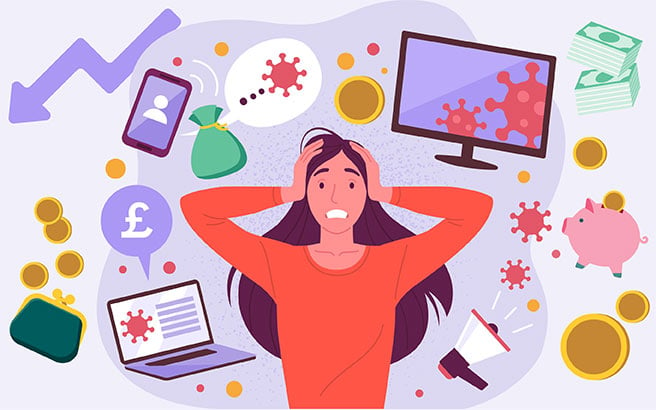It won’t surprise you to hear the pandemic has made stress and anxiety levels rocket. The combination of job losses, money problems and health worries are all contributing to this increase.
Even before Covid-19, the Money Advice Service estimated that 8.3 million people in the UK were over-indebted, and that 22% of UK adults had less than £100 in savings – making them highly vulnerable to a financial shock such as job loss or large unexpected bills.
When it comes to psychological stress – usually experienced when under mental, physical or emotional pressure – many people have wondered about its potential link to an increased risk of cancer. However, a number of studies that have taken place over several years have concluded that there is no evidence that those who are more stressed are more likely to get cancer as a direct result.
How stress affects lifestyle
It’s widely known that people under pressure will sometimes behave in unhealthy ways in order to manage their stress levels better. Being in debt can be highly stressful and will likely affect people’s lifestyle choices.
This might take the form of:
- eating more than usual
- eating food higher in fat or sugar
- drinking more alcohol than normal
- smoking more
- or doing less physical activity.
For example, in the UK, 2020 was the first year in a decade not to see a drop in tobacco sales, and a survey from the British Nutrition Foundation found that 45% of people attribute ‘stress, anxiety and tiredness’ as one of the main reasons for eating less healthily than usual during the first UK lockdown. In turn, all these choices can increase cancer risk.
Small changes can help
There are, however, a number of small changes you can make that will help to reduce your cancer risk. They may also indirectly help reduce your stress levels, and don’t have to impact your bank balance.
These changes are set out within our 10 Cancer Prevention Recommendations. They are based on the latest scientific research and the advice is practical and simple to understand.

In the meantime, if you are struggling with your finances or you cannot repay your debts in a reasonable amount of time, it’s important to get specialist advice from a free debt advice agency. Organisations that can help include:
- National Debtline (England, Scotland and Wales)
- StepChange Debt Charity
- Citizens Advice
- PayPlan
- Advice NI (Northern Ireland).
These organisations provide telephone advice services and online information.
Citizens Advice and Advice NI also offer face-to-face debt advice (when Covid-19 restrictions allow). You can also search for local debt advice services near you at moneyadviceservice.org.uk.
Where next?
> Read our blog on how to combat stress-triggered habits in lockdown
> Find out how you can eat healthily without breaking the bank
